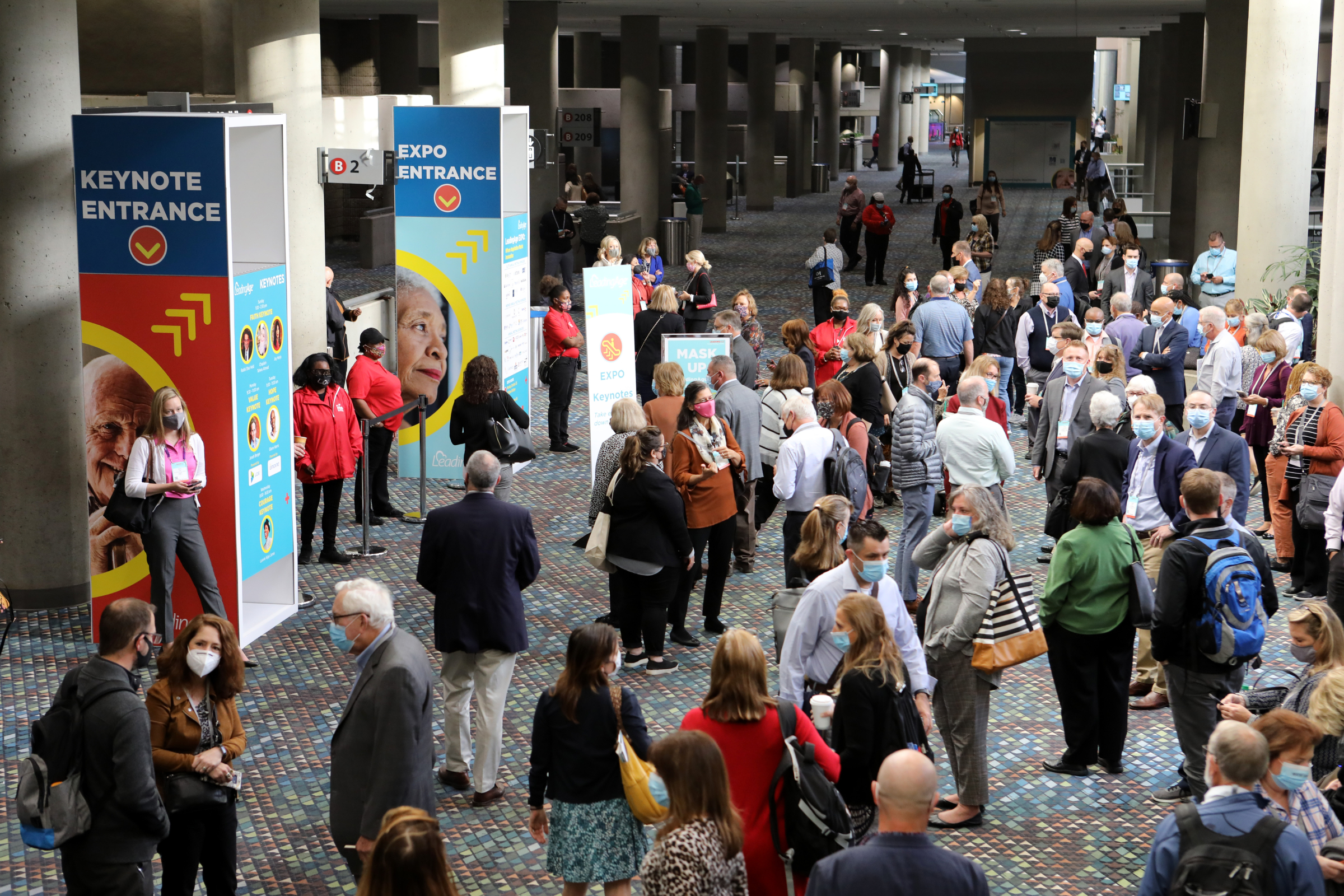Vaccine Forum Explores Challenges, Opportunities for Senior Housing Providers
As many HUD-assisted senior housing communities hold COVID-19 vaccine clinics through the CDC’s Pharmacy Partnership for Long-Term Care Program, LeadingAge hosted housing providers and experts on a January 19 panel to share insights and answer questions.
Speakers featured on the panel included Dr. Ruth Link-Gelles with the CDC; Toby Halliday with HUD, Dr. Robin Jump with Case Western Reserve University; Karina Barragan with Telacu Residential Management; Nancy Evans with CSI Support and Development; and Peter Desjardins with Volunteers of America.
Health Equity and Priority Vaccine Roll-Out
The first speaker during the LeadingAge Section 202 and Vaccine Clinics Forum, Ruth Link-Gelles, an epidemiologist with the CDC who is overseeing the federal effort to connect long-term care communities with pharmacies distributing the vaccine, explained the goals of the Pharmacy Partnership program underway since late December: “What defines this program is that [these communities and residents] need the vaccine to come to them.”
In contrast to separate state vaccine distribution plans, where an individual might be able to go to a location to get vaccinated, the CDC has contracted with pharmacy providers to go to congregate settings to do group vaccinations, including HUD Section 202 senior housing communities.
Dr. Link-Gelles described the CDC’s motivations for including HUD Section 202 communities in the early distribution prioritization: “We thought through things like, who are the most at risk individuals for getting severe disease or dying of COVID-19, and that’s obviously older individuals, and HUD [Section 202] fits that criteria.”
Dr. Link-Gelles went on to describe the health equity approach that CDC applied in their decision-making: “The other big criteria we looked at for inclusion in the program was who has a barrier to getting a vaccine… HUD 202 folks, because they are frail and because these are such low income individuals, individuals for whom filling up a car with a tank of gas or even paying for bus fare might be a deterrent to getting a vaccination, it made sense to include them in this priority roll out,” said Dr. Link-Gelles.
Dr. Link-Gelles estimates around 2 million administered through the Long-Term Care partnership program with pharmacies alone, and announced that the CDC’s vaccine website will soon be updated to reflect numbers vaccinations for Long-Term Care residents and staff by state.
For non-202 senior housing communities or those not registered with the pharmacy program, Dr. Link-Gelles recommended participating in an upcoming “retail pharmacy program” for vaccine, due to launch at the end of February, pending vaccine supplies. The retail pharmacy program will feature 21 different pharmacy partners, including those already working with small and community-level partners on flu clinics, for example.
HUD Perspective on Health and Housing
Because of the unique position of housing providers in an otherwise medically-dominated Long-Term Care pharmacy partnership overseen by the CDC, housing providers organizing vaccine clinics have been faced with many challenges and questions. Toby Halliday, the director of HUD’s office of asset management and portfolio oversight within the agency’s Multifamily Housing programs, joined the panel to provide guidance for housing providers.
“We were very pleased with the [CDC] decision to include Section 202s in the early distribution of the vaccine, and we will support that effort in any way we can” said Mr. Halliday. While HUD has expressly allowed the use of common spaces at housing communities for vaccine clinics, HUD stopped short of providing specific guidance on hosting vaccine clinics at HUD-assisted communities, preferring to leave that up to the CDC and state or local health entities.
Mr. Halliday did caution HUD-assisted housing providers to maintain resident rights and protections when handling sensitive health information, and to be careful not to base decisions of occupancy or access to activities or services at the community on a resident’s medical history, including vaccination status.
“Owners have no legal justification for requiring residents to provide information on their private medical history, including whether they’ve been vaccinated and [owners] certainly can’t exclude residents from activities based on private health information,” said Mr. Halliday.
A more comprehensive overview of HUD direction on COVID-19 vaccine clinics is also available.
Clinical Perspective on COVID-19 Vaccines
To help housing staff better understand what to expect medically when hosting a vaccine clinic, the panel also featured Dr. Robin Jump, Associate Professor of Medicine at Case Western Reserve University and Infectious Disease Physician at Louis Stokes Cleveland VA Medical Center. Dr. Jump emphasized the safety profile of both the Pfizer and the Moderna vaccine, and called the 95% efficacy of each vaccine “far better than what we get for an influenza vaccine.”
For side effects, Dr. Jump explained that “our older adults should not have as many side effects as our younger adults will.” Addressing vaccine hesitancy, Dr. Jump said: “There are some people that are never going to change their minds….but for people who have questions, concerns, fears, maybe misinformation…those are the folks we can offer education to.”
Dr. Jump also emphasized the importance of continuing safety precautions, including mask wearing and social distancing, until there is enough immunity built up throughout the country.
Overcoming Operational Challenges
With inconsistencies among states, municipalities, and pharmacy partners, and with little direction or support to get clinics set up, housing providers have been faced with countless challenges, and above all, many unanswered questions.
Despite the challenges, Karina Barragan, the Director of Resident Services and 504 Coordinator with Telacu Residential Management in southern California, described housing communities with close to 100% vaccine take-up among residents and staff. “For me it was very surprising that there was a lot of residents that said yes, sign me up for it.”
At the time of the panel, Telacu had hosted three clinics, with 22 housing communities accepted into the program. “Scheduling has been hectic,” said Barragan, especially for communities that have been affected by COVID-19 cases, and for staff who are not used to handling or uploading resident medical information to the CVS or Walgreens online platforms.
Nancy Evans, the CEO of CSI Support and Development headquarted in Michigan, described the juggling required by her staff to coordinate 59 properties in four states, including clinics with 90% participation and some with closer to 30% participation among residents. “Part of the problem is the time between when they call you to schedule and when they get out there is a blink of an eye, just a few days.”
In terms of timing, Evans described one vaccine clinic that immunized 147 people in a matter of four hours, including the post-vaccination monitoring for side effects. Calling the clinic preparations “an art, not a science,” Evans also offered a communications tip for housing staff working with busy pharmacy staff: Get their cell phones numbers and text them for updates.
With 30 clinics behind them and their first set of second rounds coming up shortly, Peter Desjardins, the Senior Vice President of Real Estate Operations for Volunteers of America, described the organization’s state-specific approach as they navigate varying state policies and approaches to vaccine distribution. Working with both pharmacy partners, Desjardins stressed the importance of flexibility: “You’re not going to get the same set up circumstances each time. It depends on who’s coming and who you’re setting up for.”
Volunteers of America has hosted one vaccine clinic using a door-to-door approach, which Desjardins said took quite a bit longer. A tip from Desjardins: “When the pharmacy first reaches out, be clear that you are independent Section 202 housing…they’re expecting a nursing home, they’re expecting someone with medical staff on hand, so be clear with them that that’s not who you are.”
A recording of the forum is available, as is a short video of a successful vaccine clinic hosted by a LeadingAge housing member. LeadingAge has also made a vaccine toolkit available for housing providers.

Most Recommended
October 15, 2025
 Shutdown Week Three: Impact of Ongoing Closure on Affordable Housing
Shutdown Week Three: Impact of Ongoing Closure on Affordable Housing
February 24, 2026
Fiscal Year (FY) Funding 2026
October 07, 2025
Immigrant Workforce Matching Program Brings Workforce Relief
Recently Added
February 26, 2026
Key Takeaways from President Trump's State of the Union
February 26, 2026
 Vance, Oz Announce Medicaid Funding Withheld From Minnesota
Vance, Oz Announce Medicaid Funding Withheld From Minnesota
February 25, 2026
CBO: HR 1 Speeds Medicare Part A Insolvency by 12 Years
February 24, 2026



